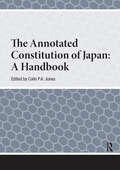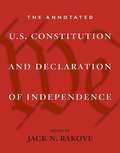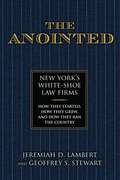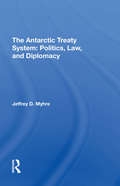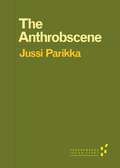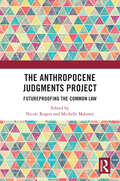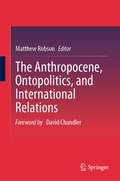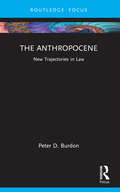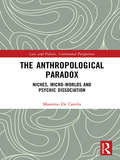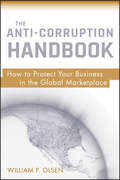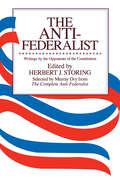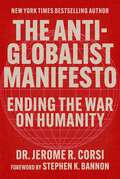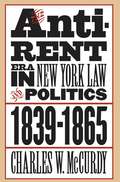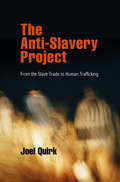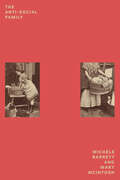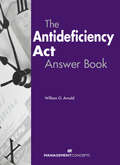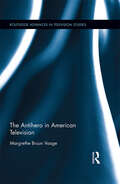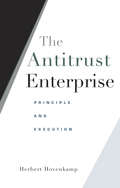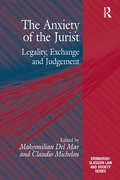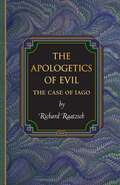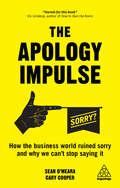- Table View
- List View
The Annotated Constitution of Japan: A Handbook (Handbooks on Japanese Studies)
by Colin P.A. JonesThe Annotated Constitution of Japan: A Handbook for the first time makes the entirety of Japan’s constitution accessible in English. The book consists of a historical and contextual overview of how the constitution came into being, followed by descriptions of each of its 103 articles; the meaning of the text, interpretive disputes, academic theories and leading cases arising under them. The book also points out the many subtle distinctions between the English version and the Japanese, some of which arose from the charter’s unique provenance. With contributors representing a broad range of expertise in various areas of Japanese law, the book is written to appeal to academics, students and general readers alike. It is intended to be the first port of call for anyone needing to understand the fundamentals of Japanese constitutional law, whether from the perspective of Japanese studies, comparative law, or political science, but unable to access the text and related literature available in Japanese. Key reference documents in English and Japanese are included as appendices for ease of reference.
The Annotated U. S. Constitution And Declaration Of Independence
by Jack N. RakoveHere in a newly annotated edition of the two founding documents of the United States of America: the Declaration of Independence (1776), our great revolutionary manifesto, and the Constitution (1787).
The Anointed: New York's White Shoe Law Firms—How They Started, How They Grew, and How They Ran the Country
by Geoffrey S. Stewart Jeremiah LambertThis is the story of how and why such powerhouse Wall Street law firms as Cravath, Swaine & Moore, Davis Polk & Wardwell, and Sullivan & Cromwell, grew from nineteenth-century entrepreneurial origins into icons of institutional law practice; how, as white-shoe bastions with the social standards of an exclusive gentlemen&’s club, they promoted the values of an east coast elite; and how they adapted to a radically changed legal world, surviving snobbish insularity and ferocious competition to remain at the pinnacle of a transformed profession. It is no accident these firms are found in New York, the largest city in the world&’s largest economy and also the nation&’s largest port, principal banking center, and epicenter of industry. At the dawn of the twentieth century, linked by canals, railroads, telegraph and telephone lines, transatlantic steamships and undersea cables, New York became the economic nerve center of the United States. It also wielded formidable political power and supplied every President or Vice President of the United States between the Civil War and the Great War.
The Antarctic Treaty System: Politics, Law, And Diplomacy
by Jeffrey D MyhreBecause negotiations for the Antarctic Treaty were kept secret, the issues that shaped the treaty system have been poorly understood. Dr. Myhre breaks new ground by examining the records of the first Antarctic Treaty Consultative Meetings and evaluating the events of the Special Consultative Meetings on Antarctic Mineral Resources. Introducing the reader to Antarctic politics, Dr. Myhre examines legal and political problems arising from some nations' claims to sovereignty in Antarctica, reviews initial efforts to create an international administration for the region, and studies in detail the terms of the treaty and the rules of procedure for the consultative meetings. Turning to the diplomatic events that molded the treaty system, he concentrates on the issues that emerged in the 1960s: conservation, the role of Meetings of Experts, the position of the Scientific Committee on Antarctic Research within the treaty system, the obligations of acceding states to uphold previous agreements, and the Consultative Powers' failure to establish an Antarctic Secretariat. Finally, he reviews the two main challenges to the system's survival—mineral extraction and Third World opposition to the present structure.
The Antelope's Strategy: Living In Rwanda After The Genocide
by Linda Coverdale Jean HatzfeldA powerful report on the aftereffects of the genocide in Rwanda—and on the near impossibility of reconciliation between survivors and killers In two acclaimed previous works, the noted French journalist Jean Hatzfeld offered a profound, harrowing witness to the unimaginable pain and horror in the mass killings of one group of people by another. Combining his own analysis of the events with interviews from both the Hutu killers who carried out acts of unimaginable depravity and the Tutsi survivors who somehow managed to escape, in one, based mostly on interviews with Tutsi survivors, he explored in unprecedented depth the witnesses' understanding of the psychology of evil and their courage in survival; in the second, he probed further, in talks with a group of Hutu killers about their acts of unimaginable depravity. Now, in The Antelope's Strategy, he returns to Rwanda seven years later to talk with both the Hutus and Tutsis he'd come to know—some of the killers who had been released from prison or returned from Congolese exile, and the Tutsi escapees who must now tolerate them as neighbors. How are they managing with the process of reconciliation? Do you think in their hearts it is possible? The enormously varied and always surprising answers he gets suggest that the political ramifications of the international community's efforts to insist on resolution after these murderous episodes are incalculable. This is an astonishing exploration of the pain of memory, the nature of stoic hope, and the ineradicability of grief.
The Anthrobscene (Forerunners: Ideas First)
by Jussi ParikkaSmartphones, laptops, tablets, and e-readers all at one time held the promise of a more environmentally healthy world not dependent on paper and deforestation. The result of our ubiquitous digital lives is, as we see in The Anthrobscene, actually quite the opposite: not ecological health but an environmental wasteland, where media never die. Jussi Parikka critiques corporate and human desires as a geophysical force, analyzing the material side of the earth as essential for the existence of media and introducing the notion of an alternative deep time in which media live on in the layer of toxic waste we will leave behind as our geological legacy. Forerunners: Ideas First is a thought-in-process series of breakthrough digital publications. Written between fresh ideas and finished books, Forerunners draws on scholarly work initiated in notable blogs, social media, conference plenaries, journal articles, and the synergy of academic exchange. This is gray literature publishing: where intense thinking, change, and speculation take place in scholarship.
The Anthropocene Judgments Project: Futureproofing the Common Law
by Nicole Rogers and Michelle MaloneyThis book is a collection of speculative judgments that, along with accompanying commentaries, pursue a novel enquiry into how judges might respond to the formidable and planetary-scaled challenges of the Anthropocene. The book’s contributors –from Australia, Asia, Europe, and the United Kingdom –take up a range of issues: including multispecies justice, the challenges of intergenerational justice, dimensions of postcolonial justice, the potential contribution of AI platforms to the judgment process, and the future of judging and law in and beyond the Anthropocene. The project takes its inspiration from existing critical judgment projects. It is, however, thoroughly interdisciplinary. In anticipating future scenarios, and designing or adapting legal principles to respond to them, the book’s contributors have been assisted by climate scientists with expertise in future modelling; they have benefitted from the experience of fiction writers in future worldbuilding; and they have incorporated elements of the future worlds depicted in various texts of speculative fiction and artworks. The judgments are, of necessity, speculative and hypothetical in their subject matter. Thus, taken together, they constitute a collaborative experiment in creating the inclusive and radical imaginaries of the future common law. The Anthropocene Judgments Project will appeal to critical and sociolegal academics, scholars in the environmental humanities, environmental lawyers, students, and others with interests in the pressing issues of ecology, multispecies justice, climate change, the intersection of AI platforms and the law, and the future of law in the Anthropocene.
The Anthropocene, Ontopolitics, and International Relations
by Matthew RobsonThis book addresses the ongoing need to explore the implications of the &‘Anthropocene&’ rupture for the field of International Relations (IR). Bringing together a group of established and early career academics, the chapters present a range of different ways of framing our current ecological and historical context, showing how they can be used to pursue new research directions and insights in areas of study such as governance, security, and migration. For that, each author displays their own preferences for a variety of divergent terms, ranging from more mainstream conceptions of an &‘Anthropocene,&’ to alternatives such as for instance the &‘Capitalocene&’ or Technocene. The book pursues a critical engagement with these different framings, unearthing, assessing and evaluating the ontopolitical assumptions which underpin them. In this way, the book aims to make an important political and ethical contribution to debates on the &‘Anthropocene&’ and its implications for the field of IR, engaging rigorously with scholarship largely from outside the more typical US-North European axis. In confronting the growing interest in the ontopolitics of the Anthropocene, which this book conceptualises within a variety of registers, this is a vital read for scholars and advanced students in IR, but also researchers in cognate or related disciplines such as law, geography, anthropology, sociology, and the arts.
The Anthropocene: New Trajectories in Law (New Trajectories in Law)
by Peter D. BurdonThis book introduces the concept of the Anthropocene and examines its importance for environmental legal thinking, research and practice. Two main arguments are explored. The first is that much of the scholarship in environmental law that addresses the Anthropocene does not respond to Earth systems science or the difference in scale as we move from local to global systems. Key examples include a focus on anthropocentrism, attempts to constitutionalise environmental protections, the prevalence of legal rights and the idea of ecological integrity. The second argument is that these points of focus derive from the prevalence of idealism in environmental legal scholarship. Idealism in this context does not refer to naivety or the presentation of unrealistic goals. Rather, this book is concerned with idealism as a philosophical commitment to the power of ideas to determine reality and drive future change. As expressed in legal scholarship, this book also argues that idealism involves an abstraction from material reality and a refusal to directly engage those forces that have given rise to the Anthropocene. In response, this book uses a method of critique to uncover the presumptions and presuppositions that underlie environmental scholarship. As a counter to idealism, it also sketches out a framework for materialism in the Anthropocene. This book’s engagement with these questions will appeal to undergraduate and postgraduate students in law, politics, philosophy or the ecological humanities. It will also be of interest to academics in these disciplines and libraries around the world.
The Anthropological Paradox: Niches, Micro-worlds and Psychic Dissociation (Law and Politics)
by Massimo De CarolisThis book addresses how the erosion of traditional forms of political association and legal regulation has given rise to a pluralism of "imperfect communities" constantly exposed to the risk of dissolution. These are niches and micro-worlds that are connected through precarious and ambivalent ties. Such a far-reaching transformation affects at one and the same time both our psychic and social identity. The book argues that this phenomenon is linked to the proliferation of new forms of psychic "disorder" – depression, personality disorder, dissociation – typical of hypermodern societies. However, while these can easily turn into genuine disorders, they can also open onto richer forms of identity, more complex than those of the past. Based on this analysis, the book’s main claim is that this dynamic epitomizes a general anthropological paradox – one that has always marked the human animal: humans are bound by their own biological constitution to fend off disorder by drawing the boundaries of artificial niches, and yet they are inclined to expose themselves to unlimited contingency so that they can find a truly suitable environment. Pursuing a novel understanding of the apparent collapse of traditional juridico-political settings, this book makes the case that the emergence of dissociations at several levels – individual, social, political, legal – does not stem from a lack of political imagination. Rather, it is a situation with which humans are inevitably confronted: a perennial tension between the limited and the unlimited, between the desire to take refuge and the desire to cross borders.
The Anti-Corruption Handbook
by William P. OlsenThe global marketplace can be risky business.Get the knowledge and tools you need to get a competitive advantage in the global markets with The Anti-Corruption Handbook: How to Protect Your Business in the Global Marketplace.Authoritative and timely, this essential guide equips you--whether you are an auditor, CFO, general counsel, internal auditor, compliance officer, or forensic accountant--to readily identify the signs of corruption and fraud in the global marketplace and successfully investigate it.This practical guide presents a clear picture of the world of global business corruption, with discussion of:The U.S. laws governing corruptionThe pitfalls of emerging marketsThe key to unmasking corrupt activityReducing risk through technologyIntellectual property theftThe current state of anti-money laundering in the global marketplaceHow to investigate allegations of corruptionCosts of corruption for industries, economies, and countriesWith detailed coverage of the evolution and accounting provisions of the Foreign Corruption Practices Act (FCPA), The Anti-Corruption Handbook: How to Protect Your Business in the Global Marketplace sheds light on the issues and threats that your business faces, the risks of doing business in the global marketplace, and the precautions your organization must take to deter such activity from occurring in the first place.
The Anti-Federalist: An Abridgment of The Complete Anti-Federalist
by Herbert J. StoringHerbert J. Storing's Complete Anti-Federalist, hailed as "a civic event of enduring importance" (Leonard W. Levy, New York Times Book Review), indisputably established the importance of the Anti-Federalists' writings for our understanding of the Constitution. As Storing wrote in his introduction, "If the foundation of the American polity was laid by the Federalists, the Anti-Federalist reservations echo through American history; and it is in the dialogue, not merely in the Federalist victory, that the country's principles are to be discovered." This one-volume edition presents the essence of the other side of that crucial dialogue. It can be read as a genuine counterpart to the Federalist Papers; as an original source companion to Storing's brilliant essay What the Anti-Federalists Were For (volume I of The Complete Anti-Federalist, available as a separate paperback); or as a guide to exploring the full range of Anti-Federalist writing. The Anti-Federalist makes a fundamental source of our political heritage accessible to everyone.
The Anti-Globalist Manifesto: Ending the War on Humanity
by Jerome R. CorsiIn his new book, The Anti-Globalist Manifesto: Ending the War on Humanity, bestselling author Jerome Corsi puts out a call for action to reverse the totalitarian goals of the New World Order globalists. Corsi addresses that these demons are well advanced in their planned &“One World Government&” takeover aimed at establishing an atheistic utopia that will have no respect for traditional human rights. Comfortable that their transhuman aspirations are achievable, the Malthusian elite is waging a war on humanity that embraces global depopulation as a means of preventing Earth's abundant natural resources for themselves. Tracing this dystopian nightmare back to the assassination of President John F. Kennedy on November 23, 1963, as the day the deep state went rogue in a conspiracy involving the CIA, the Pentagon, the State Department, and the Department of Justice to affect a coup d'état that would allow the military industrial complex to go to war in Vietnam, the deep state has created an ongoing Truman Show—a series of never-ending psychological operations designed to induce citizens worldwide to surrender freedoms to government in return for security. With the premise that the globalist elite uses systems of mass manipulation and social engineering to induce the world's population to accept the implementation of the "reforms" it has already decided to implement, Corsi sets a detailed plan for organizing global resistance against the subversives who now sit at the top of the institutions or world government and finance.The Anti-Globalist Manifesto is a call to action to restore God to our lives, as those of us fighting for a return to personal freedoms and limited government, ending the war on humanity and driving once and for all time the New World Order globalists back to Hell where they belong.
The Anti-Oligarchy Constitution: Reconstructing the Economic Foundations of American Democracy
by William E. Forbath Joseph FishkinA bold call to reclaim an American tradition that argues the Constitution imposes a duty on government to fight oligarchy and ensure broadly shared wealth. Oligarchy is a threat to the American republic. When too much economic and political power is concentrated in too few hands, we risk losing the “republican form of government” the Constitution requires. Today, courts enforce the Constitution as if it has almost nothing to say about this threat. But as Joseph Fishkin and William Forbath show in this revolutionary retelling of constitutional history, a commitment to prevent oligarchy once stood at the center of a robust tradition in American political and constitutional thought. Fishkin and Forbath demonstrate that reformers, legislators, and even judges working in this “democracy of opportunity” tradition understood that the Constitution imposes a duty on legislatures to thwart oligarchy and promote a broad distribution of wealth and political power. These ideas led Jacksonians to fight special economic privileges for the few, Populists to try to break up monopoly power, and Progressives to fight for the constitutional right to form a union. During Reconstruction, Radical Republicans argued in this tradition that racial equality required breaking up the oligarchy of slave power and distributing wealth and opportunity to former slaves and their descendants. President Franklin Roosevelt and the New Dealers built their politics around this tradition, winning the fight against the “economic royalists” and “industrial despots.” But today, as we enter a new Gilded Age, this tradition in progressive American economic and political thought lies dormant. The Anti-Oligarchy Constitution begins the work of recovering it and exploring its profound implications for our deeply unequal society and badly damaged democracy.
The Anti-Rent Era in New York Law and Politics, 1839-1865
by Charles W. MccurdyA compelling blend of legal and political history, this book chronicles the largest tenant rebellion in U.S. history. From its beginning in the rural villages of eastern New York in 1839 until its collapse in 1865, the Anti-Rent movement impelled the state's governors, legislators, judges, and journalists, as well as delegates to New York's bellwether constitutional convention of 1846, to wrestle with two difficult problems of social policy. One was how to put down violent tenant resistance to the enforcement of landlord property and contract rights. The second was how to abolish the archaic form of land tenure at the root of the rent strike.Charles McCurdy considers the public debate on these questions from a fresh perspective. Instead of treating law and politics as dependent variables--as mirrors of social interests or accelerators of social change--he highlights the manifold ways in which law and politics shaped both the pattern of Anti-Rent violence and the drive for land reform. In the process, he provides a major reinterpretation of the ideas and institutions that diminished the promise of American democracy in the supposed "golden age" of American law and politics.
The Anti-Slavery Project
by Joel QuirkIt is commonly assumed that slavery came to an end in the nineteenth century. While slavery in the Americas officially ended in 1888, millions of slaves remained in bondage across Africa, Asia, and the Middle East well into the first half of the twentieth century. Wherever laws against slavery were introduced, governments found ways of continuing similar forms of coercion and exploitation, such as forced, bonded, and indentured labor. Every country in the world has now abolished slavery, yet millions of people continue to find themselves subject to contemporary forms of slavery, such as human trafficking, wartime enslavement, and the worst forms of child labor. The Anti-Slavery Project: From the Slave Trade to Human Trafficking offers an innovative study in the attempt to understand and eradicate these ongoing human rights abuses.In The Anti-Slavery Project, historian and human rights expert Joel Quirk examines the evolution of political opposition to slavery from the mid-eighteenth century to the present day. Beginning with the abolitionist movement in the British Empire, Quirk analyzes the philosophical, economic, and cultural shifts that eventually resulted in the legal abolition of slavery. By viewing the legal abolition of slavery as a cautious first step--rather than the end of the story--he demonstrates that modern anti-slavery activism can be best understood as the latest phase in an evolving response to the historical shortcomings of earlier forms of political activism.By exposing the historical and cultural roots of contemporary slavery, The Anti-Slavery Project presents an original diagnosis of the underlying causes driving one of the most pressing human rights problems in the world today. It offers valuable insights for historians, political scientists, policy makers, and activists seeking to combat slavery in all its forms.
The Anti-Social Family (Radical Thinkers)
by Michèle Barrett Mary McIntoshDespite much talk of its decline, the nuclear family persists as a structure central to contemporary society, a fact to be lamented, according to the ideas of Michèle Barrett and Mary McIntosh. The Anti-social Family dissects the network of household, kinship and sexual relations that constitute the family form in advanced capitalist societies to show how they reinforce conditions of inequality. This classic work explores the personal and social needs that the family promises to meet but more often denies, and proposes moral and political practices for more egalitarian caring alternatives.
The Antideficiency Act Answer Book
by William G. Arnold CCFM-A, CCAAvoid Violations of the Antideficiency Act!Antideficiency Act (ADA) violations within both the financial and audit communities are now at an all-time high. Violations often result from a lack of knowledge about what is and what is not permissible under the law. The Antideficiency Act Answer Book is an easy-to-understand question-and-answer tool that guides you through all the rules associated with the Antideficiency Act and helps you detect and report violations in a timely manner.• Covers all aspects of the Antideficiency Act, from its history to common violations, penalties for violation, and reporting requirements• Includes the tools you need to help avoid Antideficiency Act violations• Plus! Includes an analysis of all the ADA reports collected by the Government Accountability Office, summarized by agency, appropriation, amount, and type of violation.
The Antihero in American Television (Routledge Advances in Television Studies)
by Margrethe Bruun VaageThe antihero prevails in recent American drama television series. Characters such as mobster kingpin Tony Soprano (The Sopranos), meth cook and gangster-in-the-making Walter White (Breaking Bad) and serial killer Dexter Morgan (Dexter) are not morally good, so how do these television series make us engage in these morally bad main characters? And what does this tell us about our moral psychological make-up, and more specifically, about the moral psychology of fiction? Vaage argues that the fictional status of these series deactivates rational, deliberate moral evaluation, making the spectator rely on moral emotions and intuitions that are relatively easy to manipulate with narrative strategies. Nevertheless, she also argues that these series regularly encourage reactivation of deliberate, moral evaluation. In so doing, these fictional series can teach us something about ourselves as moral beings—what our moral intuitions and emotions are, and how these might differ from deliberate, moral evaluation.
The Antitrust Enterprise: Principle and Execution
by Herbert HovenkampAfter thirty years, the debate over antitrust's ideology has quieted. Most now agree that the protection of consumer welfare should be the only goal of antitrust laws. Execution, however, is another matter. The rules of antitrust remain unfocused, insufficiently precise, and excessively complex. The problem of poorly designed rules is severe, because in the short run rules weigh much more heavily than principles. At bottom, antitrust is a defensible enterprise only if it can make the microeconomy work better, after accounting for the considerable costs of operating the system. <P><P>The Antitrust Enterprise is the first authoritative and compact exposition of antitrust law since Robert Bork's classic The Antitrust Paradox was published more than thirty years ago. It confronts not only the problems of poorly designed, overly complex, and inconsistent antitrust rules but also the current disarray of antitrust's rule of reason, offering a coherent and workable set of solutions. The result is an antitrust policy that is faithful to the consumer welfare principle but that is also more readily manageable by the federal courts and other antitrust tribunals.
The Antitrust Enterprise: Principle and Execution
by Herbert HovenkampAfter thirty years, the debate over antitrust's ideology has quieted. Most now agree that the protection of consumer welfare should be the only goal of antitrust laws. Execution, however, is another matter. The rules of antitrust remain unfocused, insufficiently precise, and excessively complex. The problem of poorly designed rules is severe, because in the short run rules weigh much more heavily than principles. At bottom, antitrust is a defensible enterprise only if it can make the microeconomy work better, after accounting for the considerable costs of operating the system. The Antitrust Enterprise is the first authoritative and compact exposition of antitrust law since Robert Bork's classic The Antitrust Paradox was published more than thirty years ago. It confronts not only the problems of poorly designed, overly complex, and inconsistent antitrust rules but also the current disarray of antitrust's rule of reason, offering a coherent and workable set of solutions. The result is an antitrust policy that is faithful to the consumer welfare principle but that is also more readily manageable by the federal courts and other antitrust tribunals.
The Antitrust Paradigm: Restoring a Competitive Economy
by Jonathan B. BakerAt a time when tech giants have amassed vast market power, Jonathan Baker shows how laws and regulations can be updated to ensure more competition. The sooner courts and antitrust enforcement agencies stop listening to the Chicago school and start paying attention to modern economics, the sooner Americans will reap the benefits of competition.
The Anxiety of the Jurist: Legality, Exchange and Judgement (Critical Studies in Jurisprudence)
by Claudio MichelonThe contributions in this volume pay homage to Zenon BaÅ„kowski, with a focus on problems concerning law’s normalization and the revitalizing force of anxiety. Ranging from political critique to methodological issues and from the role of human rights in development to the role of parables and analogy in legal reasoning, the contributions themselves are testament to the richness of BaÅ„kowski’s scholarship, as well as to the applicability of his core ideas to a wide range of issues. Divided into five parts, the book focuses on the role and methods of the jurist; conceptions of legality and the experience of living under rules; jurisprudential issues affecting exchange and the market; and the burden and methods of legal judgement. It also includes BaÅ„kowski’s 2011 valedictory lecture and a bibliography of his work. Comprising all original contributions, the contributors represent a balance of established, leading figures and younger, emerging scholars in the field of legal and social theory.
The Apologetics of Evil: The Case of Iago (Princeton Monographs in Philosophy #26)
by Richard RaatzschThis book is a concise philosophical meditation on Iago and the nature of evil, through the exploration of the enduring puzzle found in Shakespeare's Othello. What drives Iago to orchestrate Othello's downfall? Instead of treating Iago's lack of motive as the play's greatest weakness, The Apologetics of Evil shows how this absence of motive is the play's greatest strength. Richard Raatzsch determines that Iago does not seek a particular end or revenge for a discrete wrong; instead, Iago is governed by a passion for intriguing in itself. Raatzsch explains that this passion is a pathological version of ordinary human behavior and that Iago lacks the ability to acknowledge others; what matters most to him is the difference between himself and the rest of the world. The book opens with a portrait of Iago, and considers the nature and moral significance of the evil that he represents. Raatzsch addresses the boundaries dividing normality and pathology, conceptualizing evil as a pathological form of the good or ordinary. Seen this way, evil is conceptually dependent on the ordinary, and Iago, as a form of moral monster, is a kind of nonbeing. Therefore, his actions might be understood and defended, even if they cannot be justified. In a brief epilogue, Raatzsch argues that literature's presentation of what is monstrous or virtuous can constitute an understanding of these concepts, not merely illustrate them.
The Apology Impulse: How the Business World Ruined Sorry and Why We Can’t Stop Saying It
by Cary Cooper Sean O'MearaSaying sorry is in crisis. On one hand there are anxious PR aficionados and social media teams dishing out apologies with alarming frequency. On the other there are people and organizations who have done truly terrible things issuing much-delayed statements of mild regret. We have become addicted to apologies but immune from saying sorry. In January 2018 there were 35 public apologies from high-profile organizations and individuals. That's more than one per day. Between them, in 2017, the likes of Facebook, Mercedes Benz and United Airlines issued over 2,000 words of apologies for their transgressions. Alarmingly, the word 'sorry' didn't appear once. This perfectly timed book examines the psychology, motivations and even the economic rationale of giving an apology in the age of outrage culture and on-demand contrition. It reveals the tricks and techniques we all use to evade, reframe and divert from what we did and demonstrates how professionals do it best. Providing lessons for businesses and organizations, you'll find out how to give meaningful apologies and know when to say sorry, or not say it at all. The Apology Impulse is the perfect playbook for anyone - from social media executive through to online influencers and CEOs - who apologise way too much and say sorry far too infrequently.
